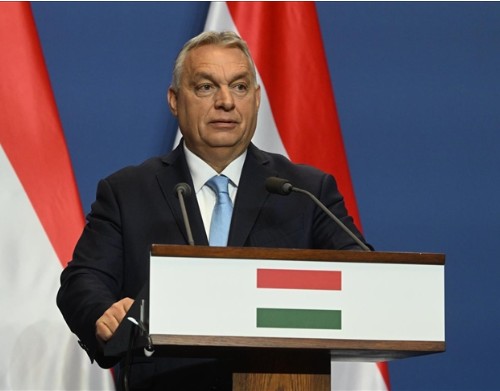Orban Claims Ukraine Will Remain a Buffer State, Not Join NATO

In a bold statement during his annual State of the Nation address in Budapest, Hungarian Prime Minister Viktor Orban asserted that Ukraine will not be granted NATO membership. Instead, he believes that Ukraine will continue to serve as a “buffer state” between the US-led military alliance and Russia, once the ongoing conflict with Moscow reaches its conclusion.
Orban’s remarks echo Hungary’s longstanding position regarding the war in Ukraine and its relations with both the European Union and Russia. Throughout the crisis, Budapest has been vocal in its criticism of the EU’s policy of delivering weapons to Ukraine. The Hungarian government has consistently advocated for a more diplomatic approach, pushing for dialogue with Moscow rather than further escalating tensions through sanctions or military aid.
“The conflict is not about Ukraine becoming a part of NATO,” Orban told his audience. “It’s about bringing the territory known as Ukraine, which has historically been a buffer zone, under NATO control, and transforming it into a formal buffer state.”
This perspective reflects Orban’s broader geopolitical strategy, which emphasizes Hungary’s neutrality and the importance of maintaining balanced relations with Russia while adhering to its commitments within the EU and NATO. While Hungary is a member of NATO, Orban has repeatedly called for the lifting of sanctions on Russia, arguing that these measures have had adverse economic impacts on Hungary and the wider region.
As the war in Ukraine continues to reshape European security dynamics, Orban’s views stand in stark contrast to those of other NATO member states, many of whom see Ukraine’s potential membership as vital to the alliance’s long-term strategy against Russian aggression.
In Budapest, Orban’s speech was met with mixed reactions. Supporters of the prime minister praise his pragmatism, pointing to the economic fallout caused by the war and sanctions as a justification for his call for dialogue with Russia. On the other hand, critics argue that Orban’s stance risks alienating Hungary from its NATO allies and undermines the unity of the West in the face of Russia’s territorial ambitions.
As the conflict moves toward a resolution, Orban’s vision for Ukraine as a buffer state continues to highlight Hungary’s unique position in European politics caught between the aspirations of NATO and the reality of its historical ties to Russia.
